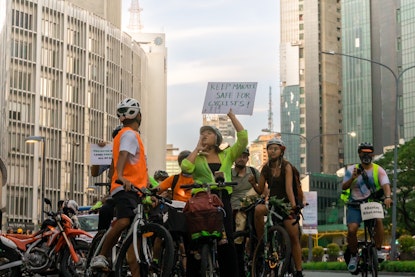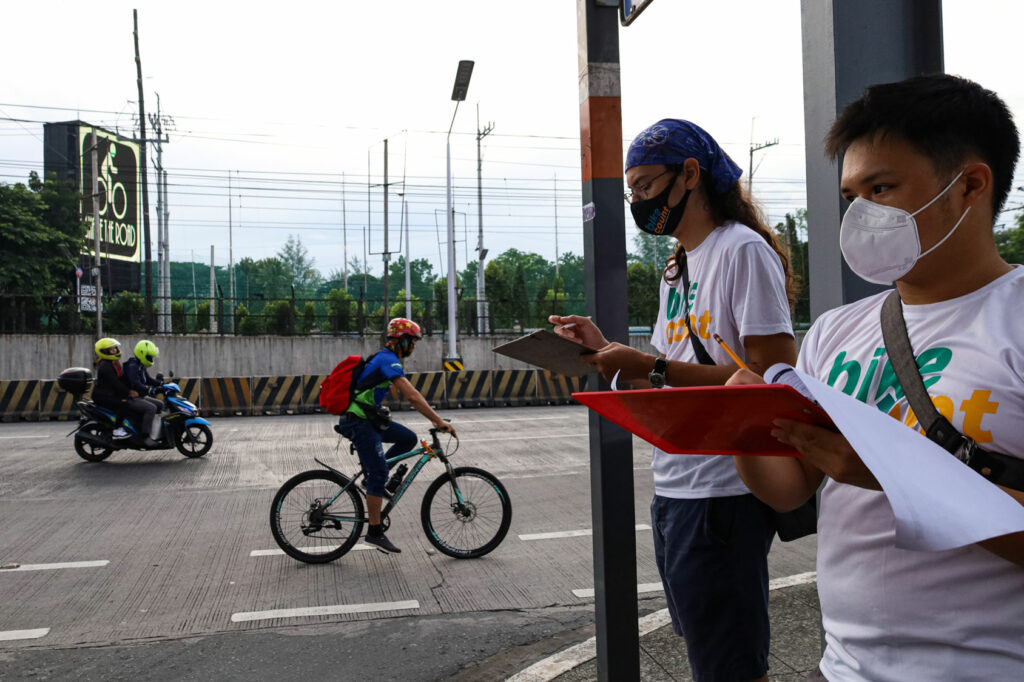Better bike lanes in the Philippines: Civic groups won a budget for bike lanes, then followed the money

When the pandemic began, the Philippines government suspended all public transport.
With only 6% of Filipinos owning private cars, the decision affected many – including doctors and nurses on the frontline fighting the virus.
“There were healthcare workers who needed to walk for around three to four hours to get where they needed to go,” says Kenneth Isaiah Ibasco Abante, President of WeSolve Foundation, a youth-led coalition accelerator for systemic change in the Philippines.
During that period of emergency mobilization, Abante was focused on tracking the country’s COVID-19 response budget, alongside friends and former colleagues from his experience working in the government, academia, and civil society.
They turned their attention to sounding the alarm about the transport crisis, when they were approached by commuters’ rights groups who were also trying to organize at the time.
Linking budgets and procurement
But the fact the government didn’t have a working budget to implement this infrastructure and other public transport initiatives was a major constraint.
Forming a coalition of 140 organizations called Move As One, these civic groups pushed for more than PHP one billion (~US$18 million) worth of protected bike lane infrastructure in the first Covid-19 emergency response budget passed in 2020. Around 500 kilometers of bike lanes were established in several major cities by 2021.
Among the members of the coalition who used this crisis as a catalyst for change were cycling groups, persons with disability groups, healthcare workers groups, commuters rights groups, urban planners, academics, faith-based groups, and development partners who were calling for protected bike lanes as part of the solution.
In total, over the last three years, they’ve secured around PHP 38 billion (~US$680 million) in government budgets for road-based public transport investment such as for protected bike lanes, buses, and jeepneys, from almost zero before the pandemic.
But they didn’t stop there. Eager to see how the budgeted funds were spent, the coalition began tracking the bike lanes’ procurement processes.
“We as citizens have the right to know how the government spends our taxes. We owe it to our broad coalition who fought for this budget, and the many advocates who came before us. We owned this budget. We all want the bike lanes to succeed,” says Abante.
With a grant from the Open Government Partnership, WeSolve and Move As One reviewed 12 publicly available contracts with the Philippine Government Electronic Procurement System (PhilGEPS) and the Department of Public Works and Highways (DPWH) website. The procedures covered 500 kilometers of pop-up bike lanes in Metro Manila (10 contracts), Metro Cebu (1), and Metro Davao (1). This partnership fulfilled part of PhilGEPS’s commitments to the Open Government Partnership (see commitment 10).

Top findings
Here are some of their discoveries.
Competition: A total of 14 unique contractors bid on the projects. All except one contract (Metro Manila) had multiple bidders.
Seven suppliers were awarded contracts. Over 50% of the total award value (PHP 573 million) was awarded to one supplier (Philippine Chemsteel Industries, Inc).
Savings: The government saved PHP 14.7 million by having multiple bidders. WeSolve and Move As One calculated further potential savings if the contracts had used market rates as a benchmark: the total possible savings ranged from PHP 29.8 million if median internal reference prices were used, to as much as PHP 214 million if the Department of Public Works and Highways construction materials price data were used.
Access to data: most documents they needed were available online, but you had to know the contract number, says the team. Searching for keywords like “bike” or “bicycle” only returned matches for one out of 12 contracts in the DPWH website. So the team used brute force: after finding one contract, they tried looking for the other 11 contracts by guessing that they had consecutive ID numbers.
Duration: The median length of the awarding process was 34 days. The pace of different projects varied. For example, the Metro Davao contract took the longest at 61 days from advertisement to "notice to proceed”. Most of the delay was in the award to contract phase, which took 40 days compared to six or less for the other 11 contracts.
Implementation of these projects is actively monitored by a highly engaged cycling community. They check the availability and quality of constructed bike lanes, particularly in major metropolitan areas using OpenStreetMaps regularly updated via crowdsourcing. Community audits via maps, photos and videos are also regularly posted by members of social media groups and pages such as How’s your byahe, bes?, Manila Bike Commuter, and Tiklop Society of the Philippines.
“Cycling groups and commuters groups are democracy in action. You really see them showing up, posting, complaining, suggesting, and commenting on how to make our bike lanes better and our streets safer. Our lives depend on having safer, protected infrastructure. Protected bike lanes protect us all,” says Abante, who is an avid cyclist himself.
“PhilGEPS was such an important partner in the project,” says Abante. The research also examined the procurement agency’s processes and capacity, making recommendations for improvements and highlighting opportunities to collaborate with other agencies, civil society and other stakeholders for better procurement outcomes.
WeSolve and Move As One presented these findings to the Department of Transportation Active Transport Project Office, who committed to opening up contracting data and regularly reporting on the status of the projects to civil society. Representatives from the Department of Transportation, Department of Public Works and Highways, the Procurement Service - Department of Budget and Management, PhilGEPS representatives, and Open Government Partnership, also responded to these findings when they were launched in a public research forum.
Moving forward in tandem: Lessons from the community and data reuse
One source of inspiration throughout the project was a contract in Mexico City to revamp its bike share program. Using an open contracting approach, the City expanded the service and adopted more user-friendly technology and design features, at half the operating costs of the old service. The Philippines team referenced this case in their literature review, shared some learnings from it with government agencies and even used it when modeling some of their data disclosures.
They also used the Open Contracting Data Standard (OCDS) when mapping the variables in their dataset. After publishing their structured open dataset, another data scientist Kenneth S. Reyes used it to create his own visualizations about the contracts, including a map of bike lane contracts in Metro Manila, a network analysis of bidders and contracts, and an itemized breakdown of the components of each contract. He also fixed some of their coding errors!
WeSolve is currently working on a new project, through OCP’s LIFT impact accelerator program, to increase transparency and accountability around government purchases and improve value for taxpayer money, in partnership with the Philippines’ Procurement Service – Department of Budget and Management.
For a comprehensive look at the bike lane research, dataset and lessons learned, visit the WeSolve website and watch the public research forum recording. “Empowering Citizens to Build Better Bike Lanes through Open Contracting” was written by Kenneth Isaiah Ibasco Abante, Reinabelle C. Reyes, Riz Supreme Balgos Comia, and Lanz Anthonee A. Lagman. This partnership between WeSolve Foundation, Inc. and PhilGEPS was funded by a grant from the Open Government Partnership.